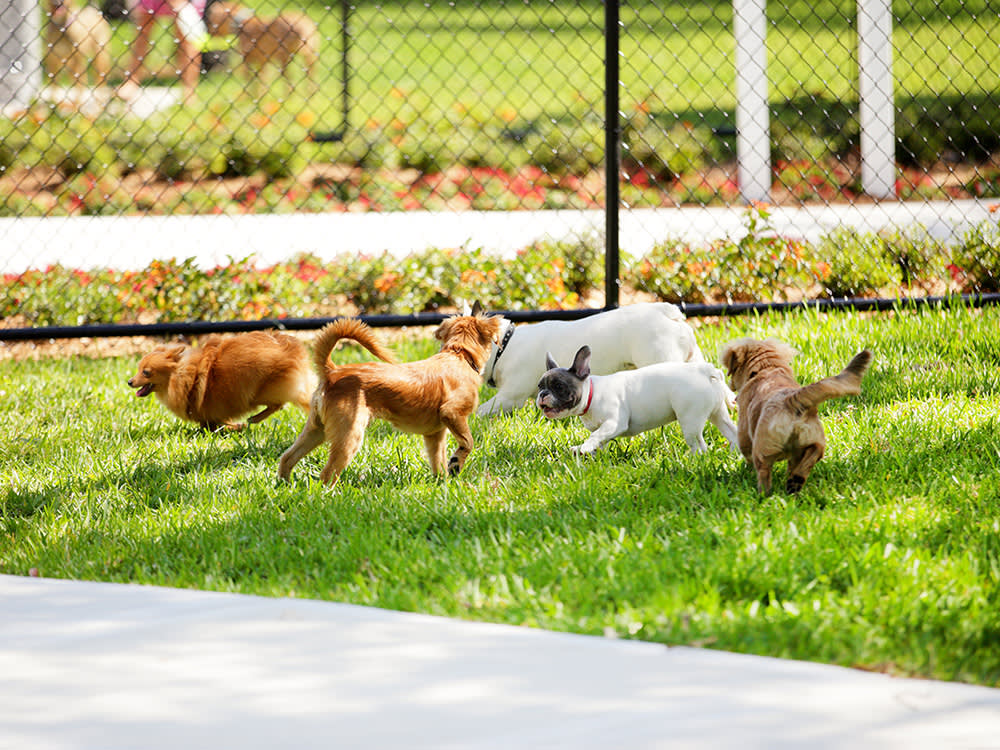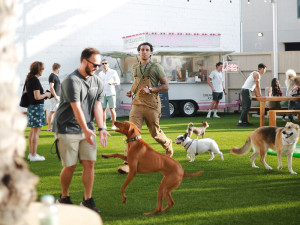Create a Neighborhood Dog Park and Win Over All the Local Pups
The hottest club in your neighborhood is...the dog park.

share article

Your pet wants you to read our newsletter. (Then give them a treat.)
What do you do when your dog has the zoomies, your hallways aren’t long enough, and your walls can’t take any more incidents of canines ramming headfirst into them? You take your pup outside. The only issue — especially if you live in a city — is finding a safe space for your dog to run free. Plus, not everyone loves dogsopens in a new tab, as hard a truth as that is to face.
The solution: The dog park, where your dog can romp with other dogs and you can socialize with other likeminded, dog-obsessed humans.
But there are downsides to off-leash play: strictly enforced leash laws can really zap the fun out of this innocent activity, turning many of us into lawbreakers. Many pet parents aren’t deterred, because we care more about our dog’s recreational needs than we do about our legal standing, but we are forced into playing hide-and-seek games with the authorities.
Many of us no doubt feel like Kevin Kraus of Washington DC: “I have a very well-trained dog so I leave him off leash and he responds and stays with me and it isn’t a problem, but I still wound up getting fined. I said this is ridiculous. I know that I’m breaking the law, but at the same time I feel as if this offense is not a problem.” Kevin’s experience is being repeated in parks everywhere, and so dog people are organizing and forming activist groups, as he did in his Dupont Circle park.
Off-leash recreation is turning into one of the biggest imbroglios in park management, and one of the most politically challenging and hotly debated items for local legislators. The problem remains: Your dog needs exercise, and you have to get them some. So, how do you develop and maintain a local dog park in your hood?
How to Advocate For a Dog Park
Changing public policy and amending laws isn’t all that easy. It can take an enormous amount of grassroots effort, aided by familiarity with governmental procedures and the tenacity of 10,000 Terriers (definitely the most important factor of all). Leaders in the movement have a lot in common with dogs: their staying power, ability to focus, and determination would make any Border Collieopens in a new tab proud.
Identify the procedures needed to get your proposal heard by the legislative body. If policy advisory commissions are involved, find out which ones recommend policy regarding parks, when they meet and, most importantly, how to get your item on an agenda. Policy can be shaped by a chairperson controlling agendas, so this might be more difficult than you think.
Note that most public meetings reserve time for public comment unrelated to any specific item; take advantage of these opportunities to introduce your proposal. Go as often as you can — hounding them isn’t a bad idea; sometimes, just showing an interest in their dull proceedings and becoming a familiar, (and hopefully friendly) face, can earn you bonus points.
Determine what public agencies are concerned with parks and dogs: Parks, Recreation, Animal Services, Public Safety and Health departments. Meet with the managers to assess their positions — offer to help with some park maintenance, like organizing a poop clean-up campaign. Let them know that you are there not just to ask for something but to provide a service as well. Not every parks and recreation staff is as efficient as Leslie Knope’s, but they could help you get started.
Befriend Your Elected Officials First
Civil servants can be your biggest enemies or best allies. Often it is up to them to support the legitimacy of your activity — and this might be key to your success.
Consult with any neighborhood groups that might have an interest in your proposal, especially targeting any and all homeowners and businesses abutting a park that might be under your consideration. Do not ignore the concerns of the community, as they will be addressed some time during the public process. Better still, become a player yourself. Get appointed to or volunteer to be on a civic committee, neighborhood council or a task force. Working from within can do wonders.
Build a Dog Park Task Force
A task force centralizes the “process,” but it needs to represent your constituency as well, with its public meetings conducted openly with schedules properly noticed, and in locations accessible to public participation. Because it is the park users who should determine local park needs, a task force shouldn’t just be packed with city hall pols and bureaucrats.
It might be difficult to convince dog people to attend numerous meetings — especially if it takes four years, which is about average for most of the successful dog park resolutions — but remind them that the game is theirs to lose. What can be the most frustrating is that even after you convince people to go to these meetings, to write their letters, to do e-mailing, the effort might only be good for one particular time frame, or one meeting. The next time you go before a committee, its members might have changed and you have to repeat the whole show all over again.
Drum Up Support For Your Dog Park
If the dog park idea starts with just a handful of supporters, you’ll need to increase your numbers — few politicians are brave enough to turn their backs on a large number of earnest voters (especially in election years). Unfortunately, volunteers often only come flocking to the cause when citations increase or the status in a park changes. The formation of Seattle’s COLAopens in a new tab (Citizens for Off-leash Areas) was inspired by an increase in citations from 300 to 1,200 in one year. SFDOGopens in a new tab got its push when dogs were banned from Ocean Beach, an area within the jurisdiction of the National Park Service, because of unsubstantiated claims that dogs were disturbing Snowy Plover nestings.
You can also be proactive, like Mary Anne Morrison-Roberts, a founder of Santa Barbara’s Dog PAC (Dog Political Action Committee), who recommends making handbills and brochures and posting them at de facto dog parks, vet offices, pet stores and dog-friendly businesses around town. She also suggests that memberships should not be subject to dues; she says it is “more important to get the people enrolled — those wishing to donate, will.” Their organization, a registered 501(c)4 nonprofit performing political action, has 1,000 members and has made remarkable strides in a very short time.
Bash Dibraopens in a new tab, a NYC dog trainer and author, has organized events, including doggie parades, to benefit Van Cortlandt Park, persuading celebrities (whose dogs he trains) to attend and contribute support — impressing both park administrators and park users. His fundraising skills and willingness to work toward consensus led to the building of a Canine Court, a state-of-the-art dog area in that Bronx park.
“I bring celebrities in and they are amazed at the response. You have to show that you have a commitment, and that members of the community participate, so we do these annual fundraisers in the parks,” Dibra says.
You should also look for support from veterinarians and humane organizations. Most vets, especially those with behaviorist training, understand the benefits of off-leash exercise to the health and well-being of their patients. Solicit letters of endorsement from them.
Dr. Nicholas Dodman, Tufts University veterinarian and behaviorist says: “Walking [dogs] on a leash is not sufficient exercise. It is not that they die if they walk on a leash, and it’s not that a human being dies in solitary confinement either. It is just that it is not optimal for their physiological and psychological well-being.” He adds, “It is important for a dog to be provided with natural outlets — to be able to run and exercise and chase things and do as a dog was bred to do.”
Gather Your Human Pack
Again, stressing the power in numbers, you might want to consider the formation of an umbrella group composed of people with a common vision. Seattle’s COLAopens in a new tab has led the way in this manner and has been recognized as the official sponsoring group, entering into a formal agreement with the city to perform various stewardship functions in their off-leash areas. New York City’s dog parents banded together to form NYCDOGopens in a new tab in response to the city’s draconian crackdown against off-leash recreation.
Write Your Case
A position paper serves a variety of purposes. It will help to synthesize your thoughts and prepare you for the public speaking circuit, and it will be the central part of your proposal (which should also include case studies and supporting affidavits). A shorter version can be used as a handy and ever-necessary “fact sheet” (important for policymakers with short attention spans), and as your press release (get to them before your opponents do).
One vital suggestion here is to use a different term for dog park. Play it safe — try using terms like “off-leash” or “multi-use area,” stressing the human component at all times. You can also use the term “OLA,” meaning “off-leash area.”
Make Your Case Even Stronger
Even though we know we are doing this for our dogs, few policymakers care about them. Discuss the benefits of pet ownership in general, citing examples from both physical and mental health literature.
Recognizing this community (“constituency”) is a concept most policymakers will appreciate. Your group’s willingness to become a dog park sponsoring group, or to take on stewardship responsibilities, such as self-policing, maintenance chores (ranging from poop clean-ups to wood chip disbursements), fundraising, assistance in shelter adoptions, increasing dog licensing compliance, etc., should not be lost on policymakers.
Every local group probably has a dog park champion, someone who can attend the bureaucrat’s meetings that other advocates can’t because their work schedules conflict with middle-of-the-day meeting schedules.
Dog owners are taxpayers, paying taxes into a system that provides parks to the public, yet most of us rarely use these green spaces for anything but walking our dogs. If you can, get some budget numbers from your recreation department to show the public resources that are being spent on sports.
Dog Park Zoning
It is beyond the scope of this space to write about macro-level planning issues or site analyses — we all know that a city should provide a series of neighborhood parks accessible to the daily needs for all its citizens, including those with dogs, with major municipal or regional parks available for special jaunts. Taking these limitations into consideration, we’ll concentrate on some zone guidelines for a prototypical off-leash park, if only in the abstract.
Size
If your OLA is located on a new site or built within an established park, size is the single most important and probably the most contentious criterion to be decided. Let it be suggested as a rule of thumb that the bigger the better.
Fencing
Another bone of possible contention is fencing. In parks close to traffic, fencing — with consideration for aesthetic concerns — might be necessary. In these cases, double-entry, self-closing gates are recommended. Unless your dogs are into high hurdling, a four-foot fence should be adequate. Chain-link (vinyl-coated) fencing is probably the least expensive.
Children
Even though allowing children into OLAs is more of an operational than a design issue, is it usually during the design stage that this issue is addressed. Most parks do allow children but some take the precaution of noting on their signage that children under a certain age must be accompanied by an adult.
Other design considerations:
Available parking that will not interfere with or disturb neighbors
Compliance with American Disabilities Act requirements — service dogs and their companions should be urged to use OLAs
Buffer Zones from neighbors who might be concerned about barking
Conveniently sited, covered trash receptacles and poop disposal product dispensers
Bulletin boards for posting notices, raising public awareness, announcing training classes, etc.
Shade trees, good drainage, maintain-able turf
Water fountains with both human and dog-level spigots
Clear, concise, and aesthetically pleasing signage
Benches, tables, agility equipment, swimming pond
Humans Benefit From Dog Parks, Too
There are great societal benefits, including enhancement of public safety, in allowing off-leash activity in parks.
Exercise not only tires a dog out, but “also generates ample supplies of the neurotransmitter serotonin, which has a mood-stabilizing and calming effect on personality,” as Dr. Nick Dodman describes in his book Dogs Behaving Badly: An A to Z Guide to Understanding and Curing Behavioral Problems.opens in a new tabHe also adds that you should exercise your dog “preferably first thing in the morning for an effect that lasts all day.”
A more relaxed dog also leads to one less inclined to bark the day away.

Claudia Kawczynska
Claudia Kawczynska was co-founder and editor-in-chief of The Bark for 20 years. She also edited the best-selling anthology Dog Is My Co-Pilot.
Related articles
![Man hiking with his dog in the forest at dusk]() opens in a new tab
opens in a new tabHikes & Hops: 8 Great Dog-Friendly Spots in the Midwest
A hike and a craft beer? Done.
![Black dog running along the shore, towards Golden Gate Bridge, San Francisco, CA]() opens in a new tab
opens in a new tabDog-Friendly Must-Sees In San Francisco’s Presidio
This summer, explore these dog-friendly beaches and heavenly hikes.
![Dog running on the beach]() opens in a new tab
opens in a new tab8 Dog-Friendly Vacation Spots in New England
From a sylvan vineyard in the Berkshires to tiny houses overlooking a waterfall in the Catskills, these weekend getaways have earned our stamp of approval.
![megan a austin city guide]() opens in a new tab
opens in a new tabMeghan Adams’ Favorite Dog-Friendly Spots in Austin
The fashion and lifestyle influencer’s picks for pet-friendly hotels, dog parks, beer gardens, and boutiques.
![A dog on a kayak in Austin, Texas with a view of the city in the background.]() opens in a new tab
opens in a new tabVisit Dog-Friendly Austin with Your Pup
Ten reasons why you should visit this pet-friendly southern city.
![A labradoodle dog sitting in the sand at Cannon Beach, Oregon.]() opens in a new tab
opens in a new tab5 Dog-Friendly Oregon Beaches
All 363 miles of the state’s coastline are publicly accessible, and almost beaches all are pet-friendly.











